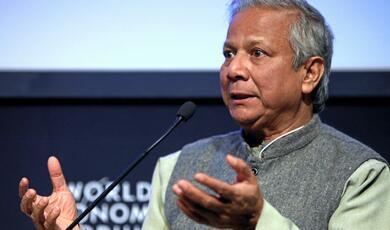Ghost of Scandals Future: Great Expectations
Share
- Details
- Transcript
- Audio
- Downloads
- Extra Reading
The litany of great financial scandals is long, and sadly unending. Dickens himself covers scandals we would recognise today in Little Dorrit and Nicholas Nickleby. Beyond Dickens, the South Sea Bubble (of course), railway shares, bonds in newly independent countries (Kingdom of Poyais), never again... IOS, Saavundra, Rolls Razor, Bank of Gibraltar, BCCI, never again... endowment mortgages, Barlow Clowes, Equitable Life, Maxwell, Lloyd's names, Lehman Brothers, payment protection insurance, never again... This symposium seeks, through the ghosts of scandals past, present and future, to see what lessons we can learn and to assess which is rosier, the future of finance or of financial scandals.
Download Transcript
10 January 2013 Ghosts of Scandals Future: Great Expectations Brandon Davies I am sure not that many of you know me and I do not know what write-up Michael has done, but for my sins, which are considerable, I have been the Head of Structured Products for Barclays Capital, I have been the Treasurer of Barclays Bank, and I am now the Chairman of a private equity company and a board director of a bank. So, if there is one thing I have known about in 40-odd years in this business, it is scandals and how they evolve. When Michael gave me the job of looking at future financial scandals, I thought the first thing I should do is consult a book that I have used a lot, because it was written by a colleague of mine who retired from Barclays at about the same time, about a decade ago. His name is Alan N. Peachy, or Alan, and it is called “Great Financial Disasters of our Time”. I am not going to advertise it hugely, except to say, because it is a rather thick read and this is quite an old edition (the latest version is coming out in two volumes), and has grown exponentially in those ten years I would say, and one of the things that one can take, should I say, from actually just glancing at it, is that there will not be financial scandals into the future. There will clearly be an awful lot of them and, as I say, they seem to be growing exponentially – certainly the book is. Let us look at the front cover really and ask ourselves just when this is going to end and why it is not. The cartoon is from Punch and it is 1890: “You have got yourselves into a fine mess with your precious speculation. Well, I will help you out of it for this once.” It is the Bank of England, of course, the Old Lady of Threadneedle Street, and the Old Lady has been helping banks out ever since, in fact long before this and ever since. Getting out my crystal ball and looking at this, it struck me that I did not want to give you a list of 1001 reasons or 1001 future scandals because it is just too easy. What I wanted to do was to try and tell the wood from the trees. The trees in here are the 1001 scandals, but the wood is rather different. The wood is actually human nature, and the one thing you cannot do after reading this book is be in any doubt that the source of financial scandals is us. It is the way we behave. So, I want to set myself a bit of a harder task that simply looking at financial scandals and telling which the future ones are. I wanted to look for a source of financial scandals that I think have been much more than financial scandals – I wanted to look at those that I think have been socially divisive, those that have been social disasters, not simply financial disasters. These seem to me to be the most dangerous elements of financial scandals because some do develop into things that are far worse than simply a few or a few thousand people losing some money, or losing quite a lot of money. They have developed into some of the worst human disasters this world has ever experienced. And so, on that...that is a pretty serious note, is it not? But I wanted to look at a few of those disasters, and I am only going to briefly mention them, but I wanted to try and predict whether I felt that we were on the verge of another such disaster, something that is not simply about losing money but that is about damaging society, and frankly, I believe we are. What I have done, to start with, was to look at where we are and what, in a sense, the conventional explanations of where we are. If we are starting from here, are there things in the narrative of the way in which we are explaining our current financial crisis which would lead me to think that there is such dangerous events on the horizon, such as not simply financial scandal but social problems. What I have done here is I have taken the typical explanations that we have, so debt de-leveraging, globalisation, technology and demographics, because all have had their little bit of blame in this process. Indeed, what are we really looking for in this – what I am looking for, let me say, and particularly as a manager of a private equity company, or a chairman of a private equity company, are safe haven investments. If there are these headwinds, if there are going to be social disasters, what should I do about them – how do I protect the people who place their money with me? Let us look at debt de-leveraging. I do not know how many of you have read it, but the paper by Reinhart and Rogoff has become extremely well-known, and I hope that any of you who are interested in this subject will read it because it is very prescient and it is also very informative. It looks at 200 years of history and the relationship between debt and GDP, and it says that once debt becomes, they chose 90%, more than 90% of GDP, then what you start to see – it does not matter in what society it is – is a serious fall in the rate of growth of the economy of those societies. Certainly, this level of debt is not simply an issue about government debt; what we also see is that many of our societies are facing debt across the board, in companies, particularly in individuals, and also in governments. This is important because the way in which we react to these circumstances have two very different readings, one by Keynes and one by Hayek. Keynes has been the basis for most of the reaction functions, the way in which governments have reacted to the current circumstances. They have thought that, by spending money, the economies would revive. Now, I will come to two conclusions: one of which is maybe they have not been spending money, which is perhaps an odd one but I will come to that in a minute, or at least not on the scale they needed to; and the other one is that Hayek may have been right all along. We are beginning to get the Bank of England looking at something called zombie companies, which is the way in which companies are not wound up by their banks but are kept in business, and that maybe this destroys the whole basis of capitalism and growth, which is that we expect companies that have no longer any economic purpose, do not fulfil a particularly useful social purpose because their purpose is to grow Gross Domestic Product, and if they fail to do so, then what will happen is that we will tie more and more of our economy up in institutions that do not grow and so will become poorer as a society. Zombie economies can lead to zombie countries. Globalisation is, in some ways, and certainly in some countries, and I can understand why, is becoming something of a controversial proposition. Globalisation has actually brought more people out of poverty in the last twenty years than in the previous 200, and globalisation has been the biggest engine of social change in this world for a very long time. We have not benefited, in my view, hugely from that, but if you happen to be in India or China or Indonesia or many other countries in the Far East, I start a talk in Indonesia (I have a lot to do with Indonesia), where I usually begin it with, “This is the seventh…” eighth or whatever it is, the latest one is the ninth I think, “…year of continuous growth at in excess of seven percent - you are more than twice as wealthy individually as when I first came here.” That is not something I say here. In fact, I began a talk on a similar subject in Greece saying, “Look on the bright side of death…” So, I am not a great humourist, but I felt it was a fairly accurate summation of an economy spiralling into a death spiral. What I am proposing here is that social problems are coming from our economic problems, and they are all too easy to see if you happen to be in Greece, or Portugal, or Italy, or Spain, or any number of other developing countries at the moment. Keynes did quite a lot of work in this area, and the belief has always been that, as our technology improves, we move people from doing cheap, not very well-paid jobs, perhaps heavily in labour, physical labour, to ones which produce more valuable outputs, and that this is the natural way in which growth occurs. What it also seems to be doing – and back to my social theme – is producing a difference between haves and have-nots. It may be that this simply is not happening anymore. The UK is probably one of the best examples of this. UK productivity seems to have stalled. It is stalled in a way in which it has not stalled for 200 years. We are going through something of sea-change in the UK economy: we are actually getting less productive as a society. That has not happened for 200 years, it has not happened since really records began. There is something potentially in this, and certainly, if it is not that, it is that what is happening is that there is becoming a large division between the haves and the have-nots. If you have technology capability, if you can work in this new world, you are very well-paid, and if you cannot, your labour is now competed for globally and a lot of people can afford to compete for that labour a lot cheaper than you can if you happen to live in the UK. We have a lot of social problems potentially growing, not just in the UK but across the Western world. Then demographics, we are getting old. Well, at least, actually, the UK and the US is not particularly getting old, actually – it’ is something of a myth there. Both of us heavily import labour, so one of the counterpoints to this is that actually we do not. If you are in Japan or China or Russia or Germany or France or, well, keep going, Portugal, Spain, keep going…what you have is a society that is effectively going into retirement. Interesting… More and more people will retire and less and less people to support them. The interesting thing about this, or I find the interesting thing about this, is that we are all told to save for our old age, and I have done and I am sure lots of you have, and we have our pension funds. It would not be a good idea to be heading for retirement if you have just raised an awful lot of debt and you owed everybody a lot of money. It is not good for you as an individual, because you need funds when you retire, and it is not good for you as an economy. So, economies that are heavily in debt, where the individuals are in debt, where the companies are debt, where the economy as a whole is in debt, is not an economy well set for retirement. I have looked at these issues, and did I conclude these were the problem? Well, actually, clearly, I concluded they are a problem, but what I concluded really was they were not the problem. I think the problem is not these things themselves; it is the reaction function. It is the way in which government is reacting to these issues. I do not say this particularly about our Government – from the statistics I am going to show you, you will see that I am quite broad about this, it affects a number of countries. But I think governments are not reacting in the way in which they should have done, and I think that they may already have got themselves into a bit of a nasty position because of their failure to react correctly, and this failure to react correctly is, I believe, going to lead to potentially an economic and potentially a social disaster. So, what I feel is that it is the reaction function, stupid – you know the saying, “It’s the economy, stupid”? Well, it is the reaction function – how you are behaving. Government policy, in my view, and the role of economists and all the support functions of central banks is to promote stable money, to create a framework, a legal framework, in which risks can be taken by people and they can make rational decisions based on the risks and returns they face. It is very important to keep money at the centre of what you do because it is actually how we behave with one another. I do not know any of you, very well – well, I know some of you well – but I am going to transact with you on the basis of money. That is how our society operates. We sell our goods, services, our capabilities – we sell these in a marketplace. It is very important that that marketplace functions correctly. My proposition is that a number of very important assets in society, have actually become completely divorced from any concept of their real value. What do I mean by this? Actually, at the moment, one of the interesting ones for me is, if you look at Swiss Franc/Euros, it is a straight line – there is no risk in switching from Francs into Euros. So, if you are a Swiss investor, if you buy Euros, if you buy Greek debt, there is no risk in that any more, there is no exchange rate difference – that is fine. Well, of course, that is a myth – in point of fact, you would be a total idiot if you believed that. So, actually, why? Because the Swiss Bank, the Swiss Central Bank is falsifying the market. In my view, if this was America, they would be in front of a judge in no time at all, and the head of the Central Bank would be in prison for 30 years, which is probably where he belongs. That is nothing to what I see happening in government debt markets. Michael alluded to something that I thought was really interesting, which is this role of monopolies. Let us suppose that you were a monopoly, let us suppose that you have the monopoly of supply over something, let us call it government bonds. Well, that does not sound too bad, does it? Let us suppose, at the same time, you actually had the right to control the price – called the Monetary Policy Committee at the Bank of England – you had the right to control the price at which those bonds were sold. Well, that does not sound totally disastrous because you are not forced to buy them. Does anybody know what percentage of UK government bonds is owned by our own Government or by the Bank of England? Would anybody like to guess the total outstanding UK debt, how much of that debt is actually owned by the Bank of England? It is about 40%. It is about 40%. The Government does not just control the supply of bonds into the market, it controls the demand for them and the price. This is an asset that is the basis of most of your pension funds. Here is my social and economic disaster. I will give you a little bit more background to it and why it is happening, because governments do not do this out of malicious intent. They act maliciously in the end, but they never intend to. This is the money supply of the United States, an intriguing graph. That slope is at about double-digits, so money supply grew for about a decade, prior to the collapse of Lehman Brothers. It grew at about ten percent per annum, cumulatively – a bit under actually in the States, but it will do, ten percent per annum. Inflation was about two, so eight percent more money was created every year for a decade – that money went somewhere… Where did it go? Answer: it went into asset prices – house prices, other fixed assets. It was blindingly obvious to see, but nobody seemed to care. Indeed, perhaps one of the most scandalous things, I think, in the whole recent history of economics, is that the Federal Reserve Board of the United States of America stopped collecting data on the supply of money into the American economy in the early-2000s. It completely ignored it. We have a Monetary Policy Committee in the United States, the Federal Reserve Board, that actually does not even know what the supply of money is into the United States’ economy, and does not care, therefore. It deliberately killed the statistics because it did not think they were very useful. Of course, if they had followed them, they would have found something like this…because this is done by a private company. As you can see, Lehman Brothers happens and money supply stops dead, for the following six years. So, now, you have an economy which you wish to grow and where inflation is about two percent and that economy has actually no more money, every day, for that six years, than it had the previous day – nothing. What happens to output and employment? They may tend to fall. Let us look at a few other economies. This is the Eurozone, less Germany. Same story… Just for the record, this is Germany, different story. I wonder who looks the most successful? This is the United Kingdom, the same old story. Money supply is dead as a dodo and in fact, is going down. What happened here was that, for reasons, in my view, to do with a belief in certain theories of economies…well, efficient markets but that does not matter, but certain theories of economics which are prevalent on the Monetary Policy Committee, and it is totally in the hands of group-think. It is exactly the same school of economics as the Federal Reserve Board. They only think one way, so it does not matter how many people you put on the Monetary Policy Committee, you never get anybody who thinks any different from the last person, so it does not actually make any difference. They all think the same way, and they all make the same mistake, which is that money simply does not grow. Well, what is the reaction that you should have to a financial disaster like Lehman Brothers or a turndown in the economy? The answer is a very simple one and our Government got it dead right, as indeed most governments have, in their analysis: what you should do is tighten fiscal policy and loosen monetary policy. Monetary policy affects asset prices, inflates things, so what you want to do is to try and create lose money, make it cheap for people to borrow, make it easy to pay back debt, and at the same time, you want to tighten fiscal policy so that you do not end up with a huge amount of debt which is slung around the neck of your population and, in the end, starts to kill off economic growth. That is what you want to do, but of course, you fail completely because you do not create the money supply. What happens then to the debt? The debt rises, and here we can see the UK and US – this is up to 2010. I am sorry, it is further now, so believe me, these things just keep going up. So what we are starting to see – these are wars. Wars always create debt. But what we are seeing here is this rising towards the 100 level, so there is an awful lot of debt around, and it is going to start affecting economic performance. It is not a prediction, as anybody who knows me, this is a favourite topic of mine. I keep this in my wallet, so I am always a trillionaire! It is actually the biggest note ever printed in terms of nominal value. It outdoes the Reichsmark. It is a Zimbabwean note. It is for 100 trillion Zimbabwean Dollars, and my daughter, who works across African, tells me it will just about get you a loaf of bread if anybody will take it. The problem is of course that, before you get to this stage, people have stopped trusting money altogether and effectively the economy runs on the US Dollar. Now, I have done the sort of exchange – the need for money to be something we all trust. What I have not done is a lot on the history of this social relationship to economics, so what I want to do, because I am not going to go through all that in this time, is to point you at somebody called Dylan Grice. He is at Société Générale, and he has written an excellent paper, in my mind, on exactly this subject about social issues to do with financial issues. He begins with Diocletian in 300AD and basically Diocletian was the Emperor, Roman Emperor, who decided to try and exterminate all the Christians, and he relates that to the Denari and its massive devaluations at that stage, the silver content was being massively reduced. He moves on to the British witch trials of the 1570s, and the slaughter of a number of ladies in the name of getting rid of witches from the economy, or from society – bloody ridiculous idea. He goes on to the French Revolution of the 1790s, and particularly the correlation between the devaluation of the money and the Reign of Terror. What he shows, actually, is quite interesting, is that the French Revolution was pretty benign up until the Reign of Terror, and the Reign of Terror really comes as a result of the devaluation of money. Then, of course, he moves into Germany, in 1923/24, which lays the groundwork for the Nazi era. That is particularly interesting because one of the statistics, which I love, is that, in 1919, German war debt amounted to 154 billion Reichsmarks. By 1923, the value of that debt, in 1914 Reichsmarks, was fifteen Pfennig. The groundwork for Hitler’s massive spending came from that massive devaluation of money. As you can see, I am somebody who believes that this is a very important issue. So, why are people fooled by this, fooled into thinking governments actually are always on your side, and is the groundwork being laid for this financial and social disaster? The answer is yes, and the answer is very simple, because, if you look at what is happening to the Federal Reserve Board, it has now accepted that the end of monetary policy is an employment target, has nothing to do with the value of money – they have abandoned all that. It is simply about an employment target – will print enough money to have the US employment level brought to a certain figure – I think it is below six percent. If you look at the Bank of England, it looks as though it is about to abandon the whole idea of inflation as the basis for holding inflation in money as the basis for its monetary policy. Its monetary policy will now be determined by nominal Gross Domestic Product, which of course is an amalgam of inflation and output, so it will simply print money to get output up. If you look at the ECB (European Central Bank), they accept that, and I have got the words here, “whatever it takes to maintain the Euro area” is the basis of monetary policy. We seem to be left in a world where our central banks are now completely getting rid of the idea that they exist to maintain the real value of currency, and that is preparation for a financial disaster, and, in my view, it is the preparation for a social disaster. Once we lose touch with that, with the value of our money, once that loses touch with us, we are in real trouble. I wanted to leave you with a last slide, which shows you the sort of trouble you can get into, because what I believe is that there is also a false belief that, if you have a certain set of regulations around the way in which the banking system works, you can somehow stop this social disaster happening, financial disaster and social disaster happening, and that is nonsense because, actually, what matters are the circumstances when you catch the Frisbee. He may catch the Frisbee, but I hope he lived to regret it, but I fear he did not. That is where I believe that our next financial disaster is coming from, and I believe it will be a social disaster as well as a financial one. I hope I have not left you in too sombre a mood, and I am obviously going to be very happy to answer questions on what I have said. I thank Gatehouse Bank because they are always willing to let me say more or less whatever I like, and to put their name on it, and that shows a lot of trust in them in me, so I would like to thank them. © Brandon Davies 2013
This event was on Thu, 10 Jan 2013
Support Gresham
Gresham College has offered an outstanding education to the public free of charge for over 400 years. Today, Gresham plays an important role in fostering a love of learning and a greater understanding of ourselves and the world around us. Your donation will help to widen our reach and to broaden our audience, allowing more people to benefit from a high-quality education from some of the brightest minds.


 Login
Login







